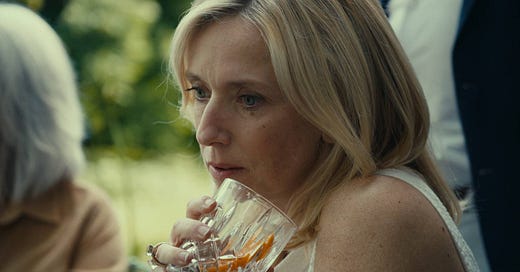Word play aside, L’Ete Dernier—Catherine Breillat’s first movie in a decade—shares a name with a personal favorite, Frank Perry’s Last Summer (1969). Both are nauseating studies of all that is unspeakable and exemplify a kind of filmmaking that is appropriately distant and overwhelmingly intimate.
The former opens with what appears to be a cross examination, where a no-nonsense lawyer grills the opposing team’s victim in pursuit of vulnerabilities to exploit. The lawyer is Anne (Léa Drucker, fab!) and the young girl facing her is not actually her client. Anne is icy as a strategy to ready the girl for court, but in her matter-of-fact probing we’re led to feel uncertain of her character—is she simply French and professional? Or are we to gather that her attitude is deliberately opaque, and that her empathy for a young woman who has presumably been taken advantage of, is bound in other emotions.
Breillat immediately shifts to a more domestic scene, Anne with her older husband Pierre and adopted twin daughters at their country home. They seems happy enough, but on the brink of something too—made all the more apparent when Pierre announces that his troubled son from his first marriage, 17-year-old Théo, will be coming to live with them. Pierre carries guilt for being an absent father and intends to bring Théo into their cozy unit. How Anne feels about this is unclear, but she ultimately proves to be gentler than her husband, or at least more present for his son, the archetype for a moody and maybe unstable teenage boy.
That the two will sleep together is not much of a surprise. This is Breillat, and if she’s going to deliver on anything it’s that stomach in your throat sensation as you wait for the inevitable collision. It happens gradually. Anne opens up about how she was not able to have biological children, and Théo’s youthful rebelliousness, his freedom and lack of care, arouses something within her. One night she ignores her better judgement, and in what is perhaps a too on-the-nose irony, is able to abandon the rigid moral compass her work forces her to have and gives into her desire for Théo.
Where the movie goes from there is often surprising even as Anne acts in the formulaic ways. There’s a quick sense of guilt, an empty declaration that the affair is a one time thing, and then a subsequent giving in to Théo and his virility. But there’s always an awareness that she’s moving through the performance of guilt. Breillat doesn’t present a woman tortured by an ethical dilemma, rather, one who is overtly afraid of getting caught, afraid that the perfect life she created for herself can be taken away the instant someone finds out.
In that sense, L’Ete Dernier isn’t about a crisis of conscience, nor is it some Hollywood-type reprobation of naughty behavior. While Anne’s work requires her to work within society’s notions of right and wrong, acceptable and unacceptable, she fantasizes about a personal life absent of such boundaries. Instead, Breillat asks, why can’t Anne have everything?
—
Last Summer and L’Ete are two different movies. Frank Perry’s film, which chronicles the misadventures of American teenagers summering in Fire Island, doesn’t share much with Breillat’s multiverse of twisted baddies, but it does, with a similar fierceness, provides us with a woman who has little interest in civility.
I wrote about it back in the day (linked above), but I was reminded of it only because I’ve been thinking, for some time, a lot about contemporary American cinema’s avoidance of taboo. I believe, more than ever, people have conflated depiction with endorsement, and for a multitude of reasons, some fair and some less fair, there exists a fear that making anything that can be deemed too grotesque, too extreme, too carnal is something punishable or career-ruining. Very few things are truly twisted and stomach churning, and when they are they are small and exist outside of any mainstream framework. Or, when they do manage to make a level of noise, they’re oversimplified (see May December is camp discourse).
A friend and I have discussed this. Both of us enjoy being made to feel uncomfortable by a movie. Both of us enjoy the questions that accompany getting high off of all that is exploitative and extreme. We like Cronenberg. We like most of the von Triers. We enjoyed Titane. Fat Girl and its infamous ending still haunts. Yet, we struggled to come up with any substantial list of American filmmakers who do/are able to take such chances. The Safdies do work in extremes, and I swear upon my Girls rewatch that Lena Dunham is actually a genius of exploitation, but…
Sometimes, I don’t want my movies to make me feel safe or affirm my values and politics. There’s nothing better than watching something and leaving feeling upended, like you can’t make heads or tails of your own thought processes. Those are the movies that stick with me.




